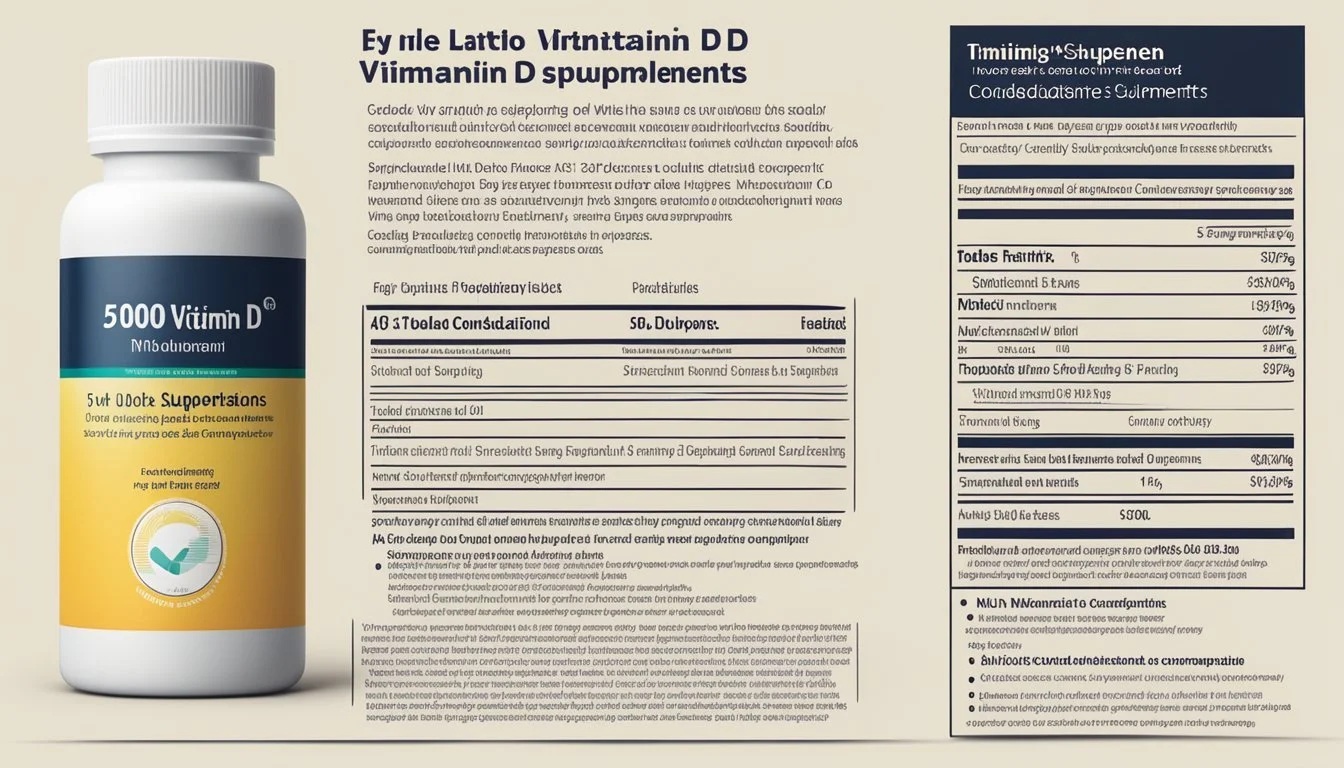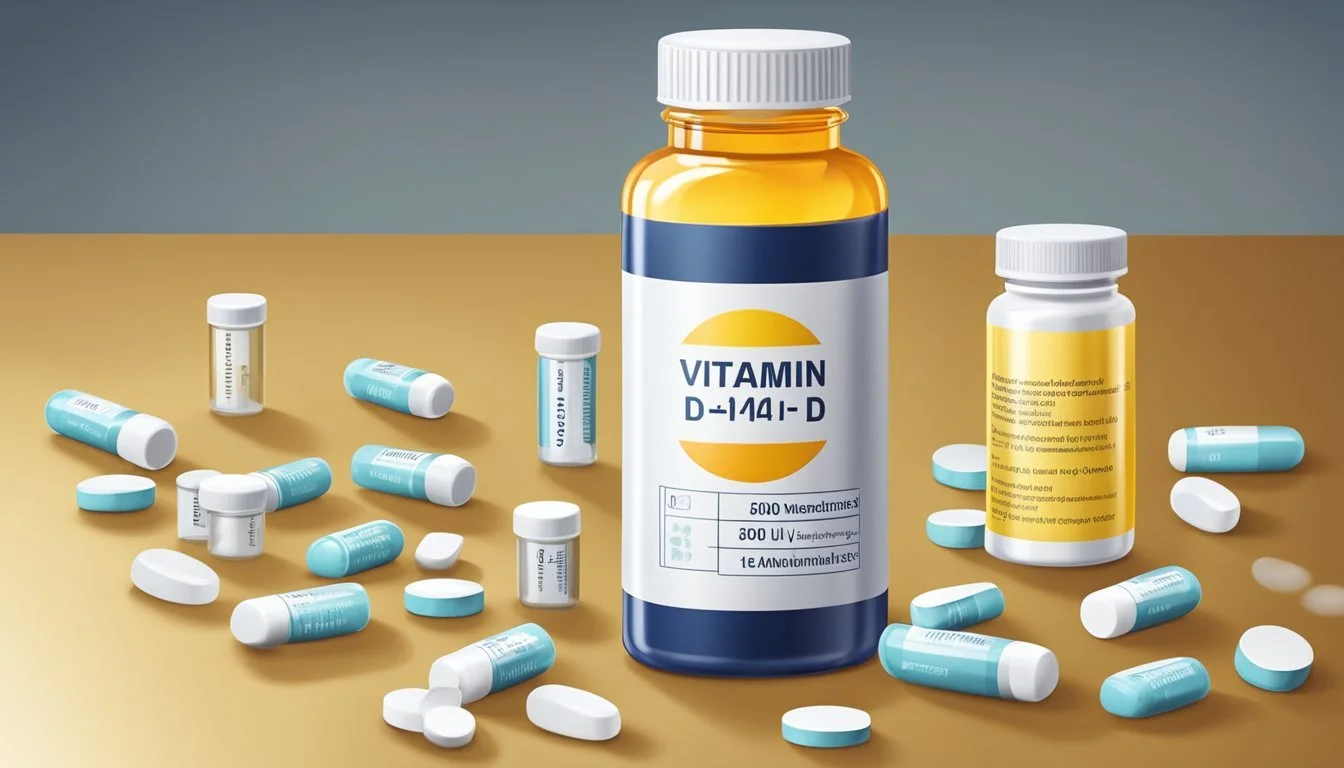Vitamin D 5000 IU: Boosting Health with High-Potency Supplements
Vitamin D plays a crucial role in maintaining strong bones, supporting immune function, and promoting overall health. While sunlight exposure is the body's natural way of producing this essential nutrient, many people turn to supplements to ensure adequate intake. Vitamin D3 supplements with 5000 IU are a popular choice for those looking to boost their vitamin D levels quickly and effectively.
These high-dose supplements can be particularly beneficial for individuals with limited sun exposure, darker skin tones, or certain health conditions that affect vitamin D absorption. A 5000 IU dose is significantly higher than the recommended daily allowance for most adults, which typically ranges from 600 to 800 IU. This higher dosage can help rapidly correct deficiencies and maintain optimal vitamin D levels in the body.
It's important to note that while vitamin D supplements can be highly beneficial, they should be taken under the guidance of a healthcare professional. Regular blood tests can help determine individual vitamin D needs and ensure that supplementation is both safe and effective. As with any supplement, it's crucial to consider potential interactions with medications and other health conditions before starting a high-dose vitamin D regimen.
Understanding Vitamin D and Its Importance
Vitamin D plays a crucial role in human health, supporting bone strength and immune function. This essential nutrient can be obtained through sunlight exposure, certain foods, and supplements.
Role in Human Health
Vitamin D is vital for calcium absorption and bone mineralization. It helps maintain strong, healthy bones and teeth throughout life. The "sunshine vitamin" also supports immune system function, reducing the risk of infections and autoimmune diseases.
Vitamin D regulates cellular processes in various body tissues. It has anti-inflammatory and antioxidant properties that protect against cellular damage. Research suggests vitamin D may help prevent certain cancers, cardiovascular diseases, and neurological disorders.
Adequate vitamin D levels are essential for muscle strength and balance. This is particularly important for older adults to reduce the risk of falls and fractures.
Sources of Vitamin D
Sunlight exposure is the primary natural source of vitamin D. When UVB rays hit the skin, they trigger vitamin D synthesis. However, factors like latitude, season, time of day, and skin pigmentation affect this process.
Dietary sources of vitamin D include fatty fish (salmon, mackerel), egg yolks, and beef liver. Some foods are fortified with vitamin D, such as milk, orange juice, and cereals.
Supplements are another option, especially for those at risk of deficiency. Vitamin D3 (cholecalciferol) is the preferred form, as it's more effective at raising blood levels than vitamin D2.
The recommended daily intake varies, but many experts suggest 1000-5000 IU for adults. Higher doses may be necessary for those with deficiency or certain health conditions.
What Are Vitamin D Supplements?
Vitamin D supplements are dietary products designed to boost vitamin D levels in the body. They come in various forms and strengths to support bone health, immune function, and overall well-being.
Different Forms of Vitamin D Supplements
Vitamin D supplements are available as D2 (ergocalciferol) and D3 (cholecalciferol). D3 is more commonly used and considered more effective at raising vitamin D levels. These supplements come in capsules, tablets, liquids, and gummies.
D3 is derived from animal sources, while D2 is plant-based. The strength of vitamin D supplements ranges from 400 IU to 5,000 IU or higher. Many people opt for 5,000 IU supplements to address deficiencies quickly.
Liquid vitamin D supplements can be particularly useful for those who have difficulty swallowing pills. Some products combine vitamin D with other nutrients like calcium or vitamin K2 for enhanced bone support.
Choosing the Right Supplement
Selecting an appropriate vitamin D supplement depends on individual needs and health status. Factors to consider include current vitamin D levels, age, skin color, and existing health conditions.
For most adults, a daily intake of 600-800 IU is recommended. However, higher doses may be necessary for those with deficiencies or specific health concerns. It's essential to consult a healthcare provider before starting high-dose supplementation.
Quality is crucial when choosing a supplement. Look for products that have been third-party tested for purity and potency. Reputable brands often undergo voluntary quality certification programs.
Consider the form of vitamin D that best suits your lifestyle and preferences. Capsules offer convenience, while liquid forms provide dosing flexibility.
Benefits of High-Dose Vitamin D Supplements
High-dose vitamin D supplements can provide significant health benefits. Research suggests that doses of 5000 IU may help optimize vitamin D levels in the body and support various aspects of health.
For Bone and Muscle Health
Vitamin D plays a crucial role in calcium absorption and bone mineralization. Higher doses can help maintain bone density and reduce fracture risk, especially in older adults.
Studies indicate that 5000 IU of vitamin D3 may improve muscle strength and function. This can lead to better balance and a decreased risk of falls in elderly individuals.
Adequate vitamin D levels support proper muscle contraction and nerve signaling. Some research suggests high-dose supplementation may reduce muscle pain and weakness in deficient individuals.
For Immune Support and Disease Prevention
Vitamin D receptors are present in immune cells, indicating its importance for immune function. Higher doses may enhance the body's ability to fight infections and reduce inflammation.
Some studies link adequate vitamin D levels to a lower risk of respiratory infections. 5000 IU supplementation might help boost immune defenses, particularly during cold and flu season.
Research suggests high-dose vitamin D may play a role in mood regulation. It may help alleviate symptoms of depression in some individuals, though more studies are needed.
Vitamin D's potential cardiovascular benefits are being explored. While not conclusive, some research indicates higher vitamin D levels might support heart health.
Risks and Considerations
Vitamin D supplements at 5000 IU can provide benefits, but also carry potential risks. Proper dosing and monitoring are essential to avoid adverse effects.
Understanding the Safe Upper Intake Levels
The safe upper intake level for vitamin D is 4000 IU per day for adults. Exceeding this amount may lead to toxicity. Factors like age, weight, and health conditions can affect individual tolerances.
Those with certain medical conditions may require higher doses under medical supervision. Pregnant women, nursing mothers, and individuals with kidney problems should consult a doctor before taking high-dose supplements.
Regular blood tests can help monitor vitamin D levels and prevent overaccumulation. It's crucial to consider total vitamin D intake from all sources, including diet, sunlight exposure, and other supplements.
Recognizing the Signs of Overdose
Vitamin D toxicity, while rare, can occur with excessive supplementation. Early symptoms may include nausea, vomiting, weakness, and frequent urination. More severe signs include kidney problems, bone pain, and confusion.
Hypercalcemia, or elevated blood calcium levels, is a serious consequence of vitamin D overdose. This can lead to calcium deposits in soft tissues and damage to the heart and blood vessels.
Other potential side effects include:
Headaches
Loss of appetite
Dry mouth
Constipation or diarrhea
Fatigue
If any of these symptoms occur, discontinue supplementation and seek medical attention promptly. Long-term excessive intake may cause irreversible kidney damage or heart problems.
Supplementation Guidelines and Dosage
Vitamin D supplementation requires careful consideration of dosage and individual needs. Proper guidance from healthcare professionals is essential for safe and effective supplementation.
Recommended Dietary Allowance vs. High Dosage
The Recommended Dietary Allowance (RDA) for vitamin D is 600-800 IU per day for most adults. However, higher doses like 5000 IU are sometimes used for specific purposes.
5000 IU is considered a high-dose supplement, exceeding the RDA by a significant margin. This dosage may be prescribed to quickly correct deficiencies or maintain higher blood levels in certain individuals.
The upper limit for daily vitamin D intake is set at 4000 IU for adults. Prolonged use of 5000 IU supplements should be monitored by a healthcare provider to avoid potential toxicity.
Some studies suggest that higher doses may have additional health benefits, but more research is needed to establish long-term safety and efficacy.
Consulting with Healthcare Providers
Before starting a 5000 IU vitamin D supplement, it's crucial to consult a healthcare professional. They can assess individual needs through blood tests and medical history.
A blood test measuring 25-hydroxyvitamin D levels helps determine the appropriate dosage. This test is essential for tailoring supplementation to each person's unique requirements.
Healthcare providers consider factors such as:
Current vitamin D levels
Sun exposure
Diet
Age
Health conditions
Medications
Based on these factors, they can recommend the most suitable dosage and duration of supplementation. Regular follow-up tests may be necessary to monitor blood levels and adjust dosage as needed.
Vitamin D in Special Populations
Vitamin D requirements vary across different population groups. Factors like age, pregnancy status, and certain health conditions can significantly impact an individual's need for vitamin D supplementation.
Age-Related Needs and Deficiency Risks
Older adults face an increased risk of vitamin D deficiency due to reduced skin synthesis and decreased dietary intake. Adults over 65 may require higher doses of vitamin D to maintain optimal levels. Children and adolescents also have unique needs, as vitamin D is crucial for bone development and growth.
Individuals with darker skin produce less vitamin D from sunlight exposure, potentially necessitating higher supplementation. Obesity can also affect vitamin D status, as excess body fat may sequester the vitamin, reducing its bioavailability.
For those at high risk of deficiency, a 5000 IU daily dose might be appropriate under medical supervision. However, regular monitoring of blood levels is essential to prevent excessive intake.
Pregnancy and Breastfeeding Considerations
Pregnant and breastfeeding women have increased vitamin D requirements to support fetal development and infant health. The recommended daily intake during pregnancy and lactation is typically higher than for non-pregnant adults.
Adequate vitamin D levels during pregnancy may reduce the risk of complications such as preeclampsia and gestational diabetes. For breastfeeding mothers, maintaining sufficient vitamin D status is crucial, as breast milk alone may not provide enough for the infant.
Supplementation needs vary based on factors like geographical location, sun exposure, and diet. Healthcare providers may recommend different dosages, sometimes including 5000 IU supplements, based on individual circumstances and blood test results.
Impact of Lifestyle and Environment
Lifestyle choices and environmental factors significantly influence vitamin D levels. Sun exposure, geographical location, and skin characteristics play crucial roles in determining an individual's vitamin D status.
Influence of Sun Exposure and Geographical Location
Sun exposure is the primary source of vitamin D for most people. UVB rays from sunlight trigger vitamin D production in the skin. However, geographical location affects the intensity and availability of UVB radiation.
People living closer to the equator typically have higher vitamin D levels due to more consistent sun exposure. In contrast, those in northern latitudes may struggle to maintain adequate levels, especially during winter months.
Seasonal variations impact vitamin D synthesis. Summer provides more opportunities for sun exposure, while winter reduces UVB availability. This can lead to fluctuations in vitamin D levels throughout the year.
Factors Affecting Skin Synthesis
Skin tone significantly impacts vitamin D production. Melanin, the pigment responsible for skin color, acts as a natural sunscreen. Individuals with darker skin require longer sun exposure to produce the same amount of vitamin D as those with lighter skin.
Age also affects vitamin D synthesis. Older adults have reduced capacity to produce vitamin D in their skin, increasing their risk of deficiency.
Sunscreen use, while important for skin protection, can hinder vitamin D production. SPF 30 sunscreen can reduce vitamin D synthesis by up to 95%. Clothing coverage and indoor lifestyles further limit sun exposure and vitamin D production.
Vitamin D Food Sources and Alternatives
Vitamin D can be obtained from various dietary sources, both animal-based and plant-based. When diet alone is insufficient, supplements offer an alternative way to meet vitamin D needs.
Animal-Based and Plant-Based Sources
Fatty fish like salmon, mackerel, and tuna are excellent sources of vitamin D. A 3-ounce serving of salmon can provide up to 450 IU of vitamin D. Cod liver oil is particularly rich, offering about 1,360 IU per tablespoon. Egg yolks contain modest amounts, with about 40 IU per yolk.
For plant-based options, certain mushrooms exposed to UV light can be good sources. Shiitake mushrooms, for example, can provide up to 40 IU per 100 grams. Fortified foods offer another option for both vegans and vegetarians. Many plant-based milk alternatives and orange juices are fortified with vitamin D, typically providing 100-144 IU per cup.
Supplementing When Diet Is Insufficient
When dietary intake is inadequate, supplements can help meet vitamin D requirements. Vitamin D3 supplements are available in various strengths, including 5000 IU doses. This high dose may be appropriate for those with severe deficiencies or limited sun exposure, but should be taken under medical supervision.
For vegans, vitamin D2 supplements derived from plant sources are available. However, D3 is generally considered more effective at raising blood levels of vitamin D. Some vegan D3 supplements are now made from lichen. Regular blood tests can help determine if supplementation is necessary and guide dosage adjustments.
Monitoring and Maintaining Adequate Blood Levels
Regular blood tests and adjusting supplementation are crucial for optimizing vitamin D levels. These practices help ensure safety and efficacy when taking 5000 IU vitamin D supplements.
Importance of Regular Testing
Blood tests measure 25-hydroxyvitamin D levels, the best indicator of vitamin D status. Most experts recommend testing every 3-6 months when starting supplementation. After reaching stable levels, annual testing is often sufficient.
Optimal blood levels typically range from 30-50 ng/mL (75-125 nmol/L). Levels below 20 ng/mL indicate deficiency, while those above 100 ng/mL may pose risks.
Healthcare providers or registered dietitians can interpret results and advise on necessary adjustments. They consider factors like age, weight, and health conditions.
Adjusting Supplementation Based on Results
Test results guide personalized dosing. If levels are low, increasing intake may be recommended. For high levels, reducing dose or frequency might be advised.
Some people absorb vitamin D better than others. Factors like body weight, skin color, and sun exposure affect individual needs.
Consistency is key. Taking supplements daily with a meal containing fat can improve absorption. Combining vitamin D with vitamin K2 may enhance its effects on bone and cardiovascular health.
Patience is important, as it can take several months to significantly change blood levels. Regular monitoring ensures safe and effective supplementation.
Factors Affecting Absorption and Utilization
Several factors influence how the body absorbs and utilizes vitamin D supplements, including 5000 IU doses. These factors can impact the effectiveness of supplementation and may require personalized approaches.
Interactions with Other Nutrients and Conditions
Calcium intake affects vitamin D absorption. High calcium levels can reduce vitamin D uptake in the intestines. Conversely, adequate vitamin D is crucial for optimal calcium absorption.
Obesity can impair vitamin D utilization. Excess body fat sequesters vitamin D, reducing its bioavailability.
Kidney failure impacts vitamin D metabolism. The kidneys play a vital role in converting vitamin D to its active form, so kidney disease can hinder this process.
Gastric bypass surgery often leads to malabsorption of fat-soluble vitamins, including vitamin D. Patients may require higher doses or alternative forms of supplementation.
Personalized Approaches to Supplementation
Individual factors necessitate tailored vitamin D supplementation strategies. Age, skin pigmentation, and sun exposure influence vitamin D needs.
Genetic variations affect vitamin D metabolism and receptor function. Some individuals may require higher doses to achieve optimal blood levels.
Certain medications can interfere with vitamin D absorption or metabolism. Patients taking these drugs may need adjusted supplementation regimens.
Regular blood tests help monitor vitamin D levels and guide dosing. This personalized approach ensures optimal supplementation based on individual needs and responses.
Optimizing Supplementation
Proper supplementation practices and high-quality products are crucial for maximizing the benefits of vitamin D3 5000 IU. These factors ensure effective absorption and optimal results.
Adhering to Best Practices for Supplement Use
Take vitamin D3 5000 IU supplements with a meal containing fat to enhance absorption. The best time is typically in the morning or early afternoon. This timing aligns with the body's natural circadian rhythm.
Consistency is key. Take the supplement daily at the same time to maintain stable vitamin D levels. Some individuals may benefit from splitting the dose, taking 2500 IU twice daily.
Monitor your vitamin D levels regularly through blood tests. This helps adjust dosage as needed and prevents oversupplementation.
Consider potential interactions with medications or other supplements. Consult a healthcare professional for personalized advice.
Importance of Quality and Purity in Supplements
Choose vitamin D3 supplements from reputable manufacturers. Look for products that have undergone third-party testing for purity and potency.
Opt for supplements free from unnecessary fillers, artificial colors, or preservatives. This reduces the risk of adverse reactions and ensures you're getting pure vitamin D3.
Check for certifications like USP (United States Pharmacopeia) or NSF International. These indicate the supplement meets rigorous quality standards.
Consider the form of vitamin D3. Softgels or liquid formulations may offer better absorption compared to tablets or capsules.
Verify the source of vitamin D3. Lanolin-derived D3 is common, but vegan options from lichen are available for those with dietary restrictions.










